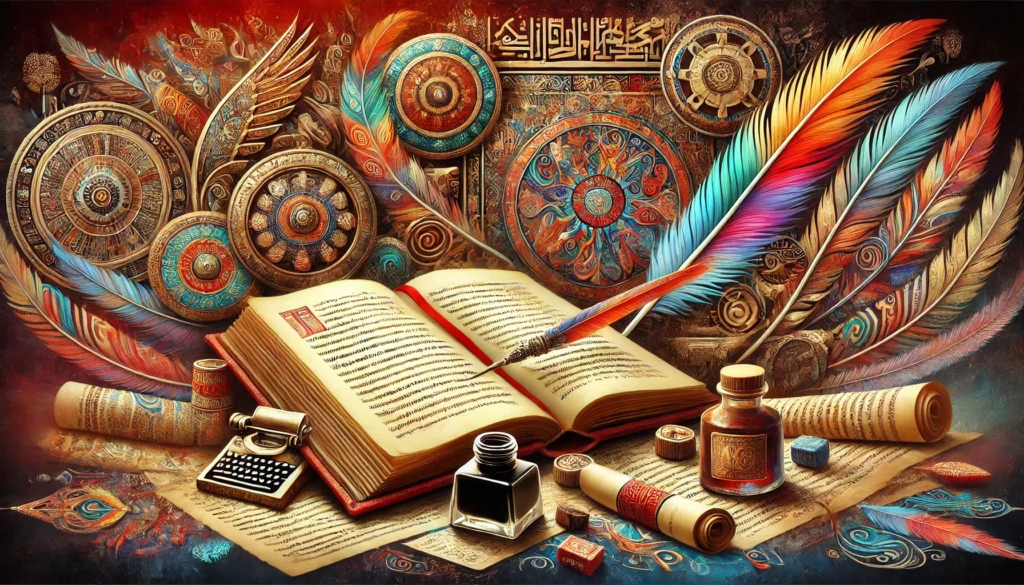
Poetry has long been a cornerstone of cultural preservation, offering a means to safeguard languages, transmit cultural values, and maintain collective memories. From ancient oral traditions to modern poetic expressions, poetry serves as a powerful tool in ensuring that a society’s language and culture continue to thrive. In this post, we explore how poetry has historically been used to preserve these critical elements of identity.
Poetry as a Vessel for Language Preservation
Historically, poetry has been a key vehicle for preserving languages. Before written language became widespread, many communities relied on oral traditions to pass down their stories, beliefs, and knowledge. Poetry, with its rhythm and rhyme, made these narratives easier to memorize and share, ensuring that languages were preserved across generations. Even in the face of external pressures and the rise of dominant languages, poetry has enabled lesser-known languages to survive and evolve.
For example, many indigenous communities used poetry as a way to preserve their native tongues in the face of colonization. Through songs, chants, and rhythmic verse, these communities ensured that their languages were passed down, often in the most subtle of ways, ensuring that the language was not lost over time.
Transmission of Cultural Values and Beliefs
Poetry is not just a medium for language preservation; it is also an avenue for transmitting a society’s core values, beliefs, and traditions. Through the use of metaphors, symbolism, and allegory, poets can communicate the philosophical underpinnings of a culture, expressing ideas about morality, community, identity, and spirituality.
For instance, many cultures have used epic poetry to tell the stories of their founding myths, legends of heroes, or the struggles that define their societies. These poems are often infused with the cultural values of bravery, loyalty, love, and sacrifice, imparting these principles to the generations that follow.
Poetry can also highlight the wisdom of elders, passing on moral teachings or life lessons that guide social behavior. In this way, poetry becomes a cultural map, helping individuals understand how they fit into the larger community and the world around them.
Preserving Collective Memories
Beyond language and values, poetry plays an essential role in preserving collective memories. Whether written in times of war, peace, celebration, or hardship, poetry captures the emotional pulse of a society and memorializes significant events. Through poems, communities are able to reflect on their collective experiences, keeping the memory of key moments alive for future generations.
Poetry can be a powerful tool for documenting the struggles and triumphs of a people, allowing the voices of past generations to be heard long after they are gone. For example, national anthems, battle songs, and victory poems serve to immortalize critical moments in a country’s history, while also giving voice to those who experienced them.
Moreover, poetry can give a voice to marginalized communities whose stories might otherwise go unheard. By recording personal and collective struggles through verse, poets ensure that these histories are preserved for posterity, becoming a source of strength and identity.
The Continued Relevance of Poetry in Modern Times
In today’s rapidly globalizing world, poetry’s role in preserving language and culture is more crucial than ever. As cultures face the threat of homogenization, poetry remains a key instrument in resisting cultural erosion. By embracing poetry, societies can continue to celebrate their linguistic and cultural uniqueness while remaining connected to their roots.
Poetry offers a means of resistance, a way to challenge cultural assimilation by asserting one’s language and identity through verse. In modern times, poets use social media, books, and public readings to keep their cultural narratives alive and relevant, ensuring that the stories of their people continue to be shared and celebrated.
Conclusion
Poetry is not just an art form; it is a powerful agent of cultural preservation. Through its ability to safeguard languages, transmit cultural values, and immortalize collective memories, poetry remains an essential tool for ensuring that cultures continue to thrive in the face of change. Whether through oral traditions or written verse, poets serve as the guardians of language and culture, carrying the torch for generations to come.
